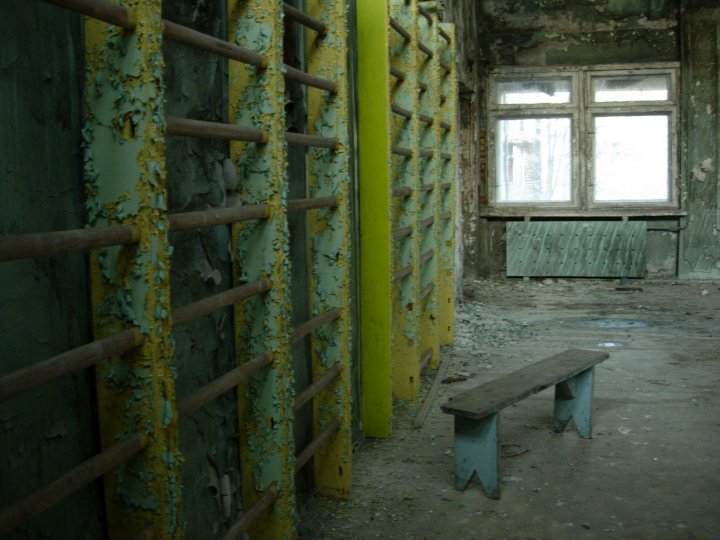Thursday, 19 April, 2007 - 23:00
Kirkegaard / Castro
Field Recordings
Jacob Kirkegaard (Daenemark, Drones)
zeigt AION: Sound- und Videoechos aus den verlassenen Ruinen von Tschernobyl
Jorge Castro (Argentinien, Noise)
zeigt UMBRAL: Echzeitbarbeitung von Field Recordings und Video
DJ Looping (Berlin, Loops)
loopt Vinyl Loops
Jacob Kirkegaard: AION
auf Deutsch:
In seiner Klang- und Videoinstallation AION verarbeitet Jacob Kirkegaard Aufnahmen aus der verbotenen Zone in Tschernobyl, die knapp 20 Jahre nach dem SuperGAU in den verrotteten Ruinen enstanden. AION fängt die unsichtbaren und unhörbaren Gefahren einer Geisterstadt ein. Ähnlich wie Alvin Lucier bei "I'm Sitting in a Room" nimmt er seine Field Recordings am Ort ihres Entstehens mehrfach übereinander auf - der Aufnahmeraum verfremdet so seinen eigenen Klang. Stille verwandelt sich so zu Drones. Zum Raumklang zeigt er Videoaufnahmen des Raumes und verfremdet sie ebenfalls durch mehrfaches Übereinanderlegen oder durch Feedback-Prozesse.
Gerne erinnern wir uns auch an den Auftritte von Jacob mit Aeter 1997 im Anorak, in der Galerie Berlin Tokyo, in der Kule oder in der Baracke des Deutschen Theaters.
in English:
Jacob Kirkegaard's AION is a sonic and visual installation that considers time, absence, and change inside the Zone of Exclusion in Chernobyl, Ukraine. Made almost twenty years after of the world's worst nuclear power accident and amidst its decaying remains, AION captures the sound and sight of an area haunted by a seemingly invisible and inaudible danger.
For AION Kirkegaard made 10-minute recordings in four abandoned spaces, a swimming pool, a small concert hall, a gymnasium and a church, and then re-recorded the playback inside each room in which it was recorded. As he repeated this process up to ten times, sound layers increased in density and in each room a drone with various overtones slowly unfolded. Kirkegaard's "sonic time layering" refers back to Alvin Lucier's work "I am sitting in a room" [1970] in which Lucier recorded his voice and repeatedly played the recording back in the space in which it was recorded. In AION, Kirkegaard himself abandoned these already abandoned spaces and waited for whatever evolved from the silence.
For the visual representation, Kirkegaard employed two basic techniques, one paralleled the recording technique by first filming the rooms and playing the image back and re-recorded multiple times. This was used for two of the four rooms, the church and the concert hall. For the other two rooms video feedback was used to under- and overexpose the image. In each case a different effect resulted from the change of exposure over time.
The rooms he found and recorded were abandoned abruptly, urgently, and for good: Their inhabitants were evacuated by Soviet military and had to leave all their belongings behind. On April 26th, 1986, the explosion of reactor 4 of the Chernobyl Nuclear Power Plant had effaced all possibilities of human survival in the vicinity. Twenty decades after the event, Kirkegaard explores the phenomenon of radiation with the medium of sound. By recording, mirroring and layering the silence of four radiating spaces he aims to unlock a fragment of the time existing inside the zone.
Jacob Kirkegaard online
PRESS PHOTOS: http://secretsounds.dk/nada/data/chornobyl/pressphotos/
Jorge Castro: UMBRAL
Jorge Castro aus Argentinien tritt seit vielen Jahren als digitaler Künstler Fisternni auf - siehe auch seine myspace Seite. Bei uns im Ausland zeigt er sein neuestes Projekt UMBRAL, bei dem er Field Recordings und Videos in Echtzeit bearbeitet. Er beschreibt seine Musik als Metro Noise, oder als experimentelle Elektronik mit Störungen, Stille und Beats.
Jorge Castro ist ein Pionier der Argentischen elektronischen Musik. Er tritt seit 1990 auf 26. Mai im ausland), Chuck Bettis, Richard Chartier, Lex Dinamo und Pablo Reche zusammengearbeitet.
DJ Looping
In den Pausen beschallt uns DJ Looping, der Vinyl-Loops auflegt.
